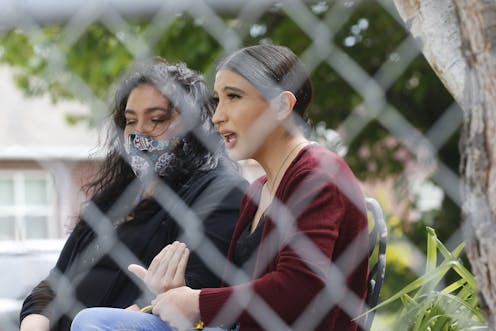Everyday ethics: Should I allow my kids to visit Mom despite her high risk status?
A mother with underlying conditions wants to hug her children even if means risking her own life with COVID-19. Should they abide by her wishes or keep their distance?


A lot of people are facing ethical decisions about their daily life as a result of the coronavirus. Ethicist Lee McIntyre has stepped in to help provide advice over the moral dilemmas we face. If you have a question you’d like a philosopher to answer, send it to us at us-ethicalquestions@theconversation.com.
I read your last article advising against visiting a mother against her wishes and it left me wondering, what if Mom wants to be visited? My wife is very high-risk – she suffers from COPD, has congestive heart failure and is on oxygen 24/7. But she has told our children to visit because she would rather die than not be able to see them. Even social distancing has broken down, and our son was horrified when his mom wanted a hug. He is afraid of giving her COVID-19, as she would likely not survive another hospitalization on a ventilator (she’s had two over the past two years). Should she be forcing herself on her children? - Alan Bolick
I am so sorry to hear about your wife’s ill health and agree that it would be best for her not to be exposed to any risk of contracting COVID-19. But it sounds like she’s got other priorities. Literally, she is willing to risk her life in order to see her children. So should they respect her choice and simply bow to her autonomy?
The tricky thing here is that it’s not just your wife’s autonomy that is at stake. It’s clear that your children are terrified of giving their mom COVID-19. If your son is “horrified” at the prospect of a hug, the guilt he might feel upon giving your wife a life-threatening illness could be devastating.
Put aside for a moment the idea that your wife could expose her children to coronavirus – that’s unlikely and not really what this is about. But she is exposing them to the possibility of a lifetime of remorse if they happen to be the one who gives her the illness that kills her. Is she okay with that?
Respect for individual autonomy is a foundational idea in ethics. Even John Stuart Mill and Immanuel Kant – two philosophers who stood on either side of the debate over whether morality should be judged by measuring consequences – agreed on the importance of autonomy as a core component of human well-being. Even if your wife feels it is “worth it” for her to take a risk, your children clearly don’t feel the same way. As such, she may not be respecting their autonomy while thinking of her own.
One solution might be for your kids to go on complete quarantine for a set period of time – the Centers for Disease Control and Prevention recommends 14 days from the last potential of exposure – with absolutely no contact with any other human being, and then spend as much time with your wife as circumstances allow. This would severely reduce the risk of infection, according to public health experts, and would apparently mean more to your wife than life itself. Knowing this, might your kids be willing to make this sacrifice?
Knowing how much it would mean to their mom, maybe so.
[You need to understand the coronavirus pandemic, and we can help. Read The Conversation’s newsletter.]
Lee McIntyre does not work for, consult, own shares in or receive funding from any company or organization that would benefit from this article, and has disclosed no relevant affiliations beyond their academic appointment.
Read These Next
TikTok fears point to larger problem: Poor media literacy in the social media age
If the US wants to protect young people from misinformation and foreign influence, focusing on TikTok…
From sumptuous engravings to stick-figure sketches, Passover Haggadahs − and their art − have been e
A scholar highlights some of the most interesting versions of the Passover text and how they’ve met…
Are tomorrow’s engineers ready to face AI’s ethical challenges?
Ethics is often neglected in engineering education, two researchers write, despite mounting questions…



